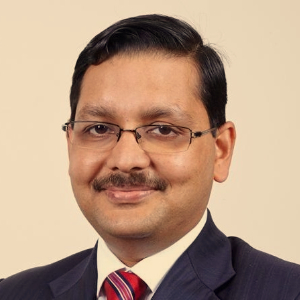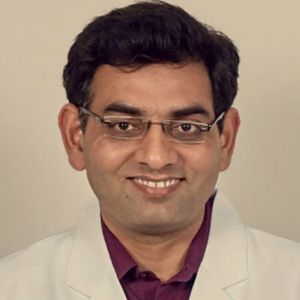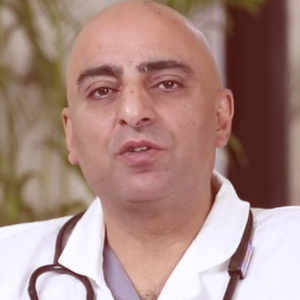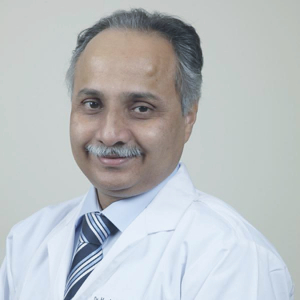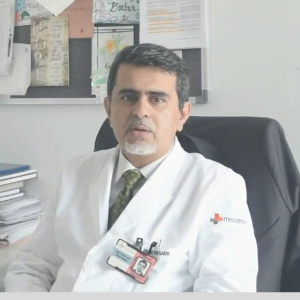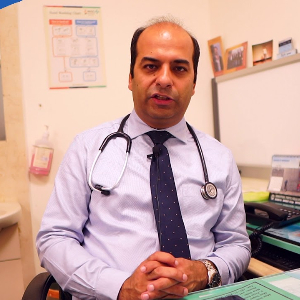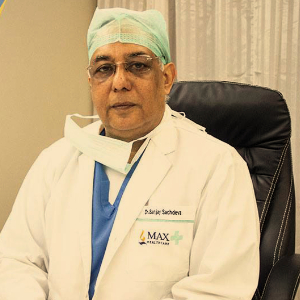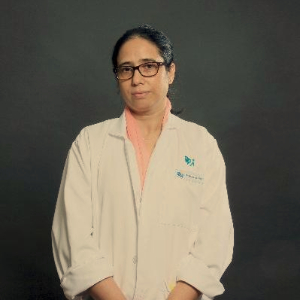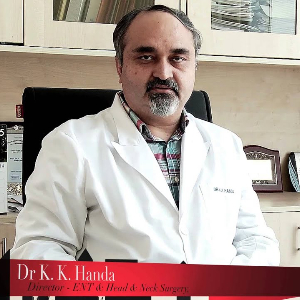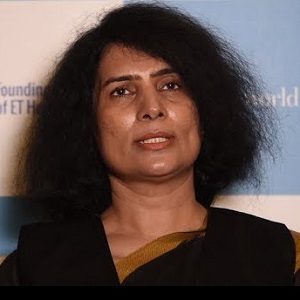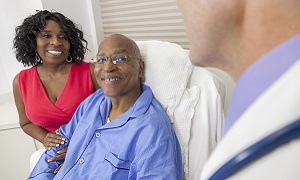Best Doctors in India for Tracheostomy
- Surgical Oncologist, Gurugram, India
- Over 26 years’ experience
Profile Highlights:
- Dr. Vedant Kabra is a reputed Surgical Oncologist with specializations in the surgical treatment of breast, head and neck, thoracic, urological, and GI cancers.
- He has more than 20 years of experience in the field and has performed more than 12,000 cancer surgeries related to breast, GI, head, and neck, and Thoracic and GI cancers.
- Surgical Oncologist, New Delhi, India
- Over 10 years’ experience
Profile Highlights:
- Dr. Surender Kumar Dabas is a well-known surgical oncologist with experience in the treatment of cancers affecting the head, neck, and thorax regions.
- He has over 10 years of experience in the field and has performed more than 8000 head, neck, and thoracic cancer surgeries.
- He also performs Robotic surgery and computer-assisted thoracoscopic surgeries along with surgery for skull base, oral cavity, esophagus, lungs, and thyroid cancers.
- Surgical Oncologist, New Delhi, India
- Over 26 years’ experience
Profile Highlights:
- Dr. Sameer Kaul is a surgical oncologist at Apollo Cancer Institute of Indraprastha Apollo Hospital, New Delhi
- He is the head of an independent Surgical Oncology Unit that comprises senior and junior consultants along with oncology nurses and other staff.
- Dr. Kaul performs all kinds of cancer surgeries related to the head and neck, breast, thoracic region, GI, genitourinary, soft tissues, and bones.
- He has 26+ years of experience in Surgical Oncology and has received his training from leading cancer centers of the world.
- Prior to joining Apollo, Dr. Sameer Kaul served in various other hospitals in India taking up different cancer cases and providing successful treatment.
- Dr. Sameer Kaul has extensive experience in Robotic surgeries and performs several of his procedures through Robotic techniques.
- He constantly works towards providing the best cancer care to the underprivileged section of society and therefore founded BCPBF – The Cancer Foundation, an NGO that works towards spreading cancer awareness.
- Dr. Kaul has been responsible for bringing various new and advanced techniques for cancer treatment to the country.
- He popularized Radio Frequency Ablation, Reconstruction for CA breast, and Post insertion in India
- Surgical Oncologist, New Delhi, India
- Over 30 years’ experience
Profile Highlights:
- Dr. Harit Chaturvedi is considered among the best surgical oncologists in India. He has over 3 decades of experience in Surgical Oncology and provides services for the surgical treatment of various types of cancers affecting the breast, head and neck, oral, abdomen, and GI regions.
- He performs surgeries for cancer patients for the removal of both breasts and lymph nodes, removal of part or entire thyroid gland, breast-conserving surgery, surgery for removal of part or entire small intestine, surgery for prostate cancer, etc.
- ENT, Head & Neck Onco Surgeon, Gurugram, India
- Over 20 years’ experience
Profile Highlights:
- Dr. Deepak Sarin is a well-known Head and Neck Onco surgeon with a specialization in oral and throat cancers.
- His interest lies in minimally invasive surgeries for head and neck cancer and is also an expert in Robotic and Laser surgery.
- He holds the credit for establishing the Head and Neck surgery department in Sir Ganga Ram & Artemis Hospital and also started the Head and Neck Surgery unit in Medanta.
- Medical Oncologist, Gurugram, India
- Over 16 years’ experience
Profile Highlights:
- Dr. Ankur Bahl is a reputed medical oncologist in India.
- With over 16 years of experience, Dr. Bahl is considered for his expertise in treating Multiple Myeloma, Lymphoma, Leukemia, Gastrointestinal tumors, Gynaecological Tumors, Head, Neck, and Brain Tumors.
- ENT Specialist, New Delhi, India
- Over 30 years’ experience
Profile Highlights:
- Dr. Sanjay Sachdeva is one of the most prominent ENT/ Otorhinolaryngologists in India with 30+ years of experience as a medical professional.
- He is currently working as the Senior Director in Max Super Specialty Hospital, New Delhi.
- Dr. Sanjay Sachdeva has received multiple awards and accolades for his incredible achievements in the field of Otorhinolaryngology.
- Surgical Oncologist, New Delhi, India
- Over 20 years’ experience
Profile Highlights:
- One of the finest oncologists in India, Dr. Ruqaya Ahmad Mir has been practicing surgical oncology for the past 20 years and is currently functioning as a Senior Consultant, Oncology at Indraprastha Apollo Hospital, New Delhi.
- Dr. Ruqaya Mir is known for her outstanding performance in some of the advanced surgical techniques which include Uterus and Ovary and Limb Conservation surgery and Cytoreductive surgery and Hyperthermic Intraperitoneal chemotherapy for advanced colorectal and recurrent ovarian malignancies.
- She is also a well trained Robotic Surgeon practicing implementation of minimal invasion in surgical oncology.
- ENT, Head & Neck Surgeon, Gurugram, India
- Over 27 years’ experience
Profile Highlights:
- Dr. Kumud Kumar Handa is a highly acclaimed ENT and Head and Neck Surgeon in India with specializations in Head and Neck cancer surgery.
- Dr. K K Handa’s expertise in the field of ENT is prominent with the 27 years of experience that he has in the field.
- His area of interest includes voice surgery, laser surgery, endoscopic sinus surgery, cochlear implant surgery, and head and neck surgery. He has helped in the treatment of a number of head and neck cancer patients with different types of cancer surgeries.
- ENT Surgeon, Otorhinolaryngologist, Head and Neck Surgeon, New Delhi, India
- Over 30 years experience
Profile Highlights:
- Dr. Kalpana Nagpal is an ENT/Otorhinolaryngologist in India with extensive expertise. She has nearly three decades of experience in performing Microscopic and Endoscopic Surgeries for sinus infections, sebaceous cysts, epistaxis, tonsillitis, and otoplasty.
- Dr. Nagpal is a senior consultant for ENT at Indraprastha Apollo Hospital. She treats patients with congenital ear problems, orbital and optic nerve decompression, and tonsillectomy in both children and adults. Her area of expertise is Head & Neck Surgery.
- Dr. Nagpal also serves as the President of the Women Association of Otolaryngologists and is active in academics.
Best Hospitals in India for Tracheostomy
Indraprastha Apollo Hospital, New Delhi
- City: New Delhi, India
Hospital Highlights:
- Indraprastha Apollo Hospital is a 700-bedded multispecialty hospital in the heart of the capital of India. It is a part of Apollo Hospital group, one of India’s most reputed healthcare chains. Indraprastha Apollo Hospital has been accredited by Joint Commission International, making it the first internationally accredited hospital in the country in 2005.
- There are 52 specialties in the hospital with one of the best cardiology centers in the country. The hospital is also equipped with State of the art infrastructure facilities with the largest Sleep Lab in Asia and the largest number of ICU bed facilities in India.
- The hospital also has one of the largest dialysis units in India along with a dedicated Bone Marrow Transplant unit.
- The latest and highly advanced technologies that are installed in the hospital include Da Vinci Robotic Surgery System, PET-MR, PET-CT, Cobalt-based HDR Brachytherapy, Brain Lab Navigation System, Tilting MRI, Portable CT scanner, 3 Tesla MRI, 128 Slice CT scanner, DSA Lab, Endosonography, Hyperbaric Chamber and Fibro scan.
Fortis Memorial Research Institute, Gurugram
- City: Gurugram, India
Hospital Highlights:
- Fortis Memorial Research Institute is a multi-super-specialty, quaternary care hospital with 1000 beds. The hospital comprises reputed clinicians, and international faculty and is also equipped with cutting-edge technology. The hospital is a part of Fortis Healthcare Limited, a reputed chain of private hospitals in India.
- It is a NABH-accredited hospital that is spread across 11 acres of land and has a capacity of 1000 beds. The hospital has 55 specialties and is one of the premier health care centers in the Asia Pacific region popularly known as “the Mecca of Healthcare”.
- The hospital has 260 diagnostic centers and is also equipped with the latest and advanced techniques that include 3 Telsa which is the world’s first Digital MRI technology. The hospital also has world-class Radiation Therapy techniques which have been developed by leading technology experts from Elekta and Brain Lab.
Apollo Hospital, Chennai
- City: Chennai, India
Hospital Highlights:
- Apollo Hospitals, Chennai, is one of the best hospitals for heart care in India. Over the years, Apollo has expanded all over India, as a healthcare chain.
- India’s first ‘Only Pancreas’ transplant was performed in Apollo Hospital. The hospital is known for successfully performing Asia’s first en-bloc combined heart and liver transplant, and over the years, it has attained a remarkable achievement in the global healthcare space. Around 3-4 organ transplants are performed in the hospital per day.
- Equipped with over 500 beds, this hospital in Chennai was established in 1983 and since then has been among the most preferred hospital for patients from all over the world.
- The hospital holds accreditation of the NABH and JCI and is the first hospital in India to be ISO 9001 and ISO 14001 certified. It is also the first South Indian Hospital to receive subsequent reaccreditation from the JCI USA 4 times.
Medanta-The Medicity, Gurgaon
- City: Gurugram, India
Hospital Highlights:
- One of India’s best and largest multi-specialty hospitals, Medanta was built with the aim to bring India to the highest standards of medical care. The hospital has been providing the best medical services to its patients, since its inception, with care, commitment, and compassion.
- Equipped with 1250 beds, the hospital was founded by Dr. Naresh Trehan in the year 2009 with an aim to provide the best medical care at affordable costs. The hospital is spread across 43 acres and includes 45 operation theatres and 350 beds dedicated solely to ICU. The hospital includes over 800 doctors, and more than 22 specialty departments and has a dedicated floor for individual specialty in order to offer the best services under one roof.
- The hospital is considered one of the premier institutes in India for Cardiac Care and includes staffs and members of high caliber. The hospital has 6 distinct centers of excellence.
Max Super Specialty Hospital, New Delhi
- City: New Delhi, India
Hospital Highlights:
- One of the well-regarded providers in India committed to the highest standards of clinical excellence and patient care, Max Super Specialty Hospital is a part of Max Healthcare, which is the second-largest healthcare chain in India. Regarded as one of the most well-regarded healthcare providers in the country, Max Super Specialty Hospital is committed to the highest standards of clinical excellence as well as patient care. The hospital is also equipped with the latest technology as well as cutting-edge research. The hospital is known to deliver and ensure the highest level of patient care.
- The hospital has more than 500 beds and offers treatment for over 35 specialties. The hospital also holds the credit of having installed the first Brain Suite in Asia. This is a highly advanced Neurosurgical machine that allows MRI to be taken while surgery is ongoing.
- Other advanced and latest technologies are also installed in the hospital such as the 1.5 Tesla MRI machine, 64 Slice CT Angiography, 4D ECHO, LINAC, and 3.5T MRI machine.
Artemis Hospital, Gurugram
- City: Gurugram, India
Hospital Highlights:
- One of the most well-known hospitals in the Delhi NCR, Artemis Hospital is the first hospital in Gurugram to get accredited by the Joint Commission International.
- With more than 40 specialties, the hospital has been designed to be one of the most technically advanced hospitals in the country, with the best medical and surgical health care. The hospital has eleven special and dedicated centers, for Heart, Cancer, Neurosciences, etc.
- The latest technologies in the hospital include Endovascular Hybrid Operating Suite and Flat panel Cath Labs for the cardiovascular department, 3 Tesla MRI, 16 slice PET CT, 64 Slice Cardiac CT Scan, HDR Brachytherapy, and highly advanced Image Guided Radiation Therapy techniques (LINAC) are installed in the hospital.
- The hospital has won several awards as well, since its inception.
BLK Max Super Specialty Hospital, New Delhi
- City: New Delhi, India
Hospital Highlights:
- Equipped with 650 beds, BLK Superspecialty Hospital is the largest stand-alone private sector hospital in Delhi.
- With over 1500 healthcare providers and 150 globally renowned super specialists, the hospital is one of Asia’s largest Bone Marrow Transplant Centres. The hospital is known for having some of the best cancer doctors in the country.
- The hospital is NABH and NABL accredited and was inaugurated by the first Prime Minister of India. Pt. Jawahar Lal Nehru.
Gleneagles Global Hospitals, Chennai
- City: Chennai, India
Hospital Highlights:
- Established in 1999, Gleneagles Global Hospital, Chennai, is one of the top healthcare facilities in Southern India. It is part of the Gleneagles Hospital Chain, which is the fourth largest healthcare chain in the country. The hospital specializes in multi-organ transplants of kidneys, liver, lungs, heart, etc.
- The hospital has an excellent infrastructure and state-of-the-art lab and equipment set-up. The hospital boasts cutting-edge technologies, a highly skilled team of doctors and surgeons, and trained support staff. Located in Perumbakam, Chennai, it is one of India’s premier health care destinations. The hospital has performed some of the most complex surgical and clinical procedures in India including multi-organ transplantations.
- The hospital’s lung transplantation program is one of the best in the country. The hospital is known for having performed India’s first single lung transplant and first minimal invasive lung transplant. It is also the only Indian hospital to be associated with King’s College Hospital, London, United Kingdom for liver transplantations.
Fortis Hospital, Mulund, Mumbai
- City: Mumbai, India
Hospital Highlights:
- Fortis Hospital in Mulund is a 315-bed multi-speciality tertiary care hospital with five JCI accreditations that offers a wide variety of diagnostic and therapeutic services. The Fortis Hospital in Mulund delivers patient-centred treatment with cutting-edge technology, highly skilled and experienced surgeons, and paramedical staff.
- This institution houses Maharashtra’s largest multi-organ transplant centre. It is also the first heart transplant centre in western India to conduct 100 or more consecutive heart transplants in under four years. It is the only hospital in the city to have multi-organ transplants and has handled the youngest patient for angioplasty. Fortis Hospital Mulund now boasts the first advanced surgical robot in central Mumbai.
- Cardiology and heart surgery, urology, nephrology, neurosciences, orthopaedics, digestive care, emergency and critical care, and maternity care are among the services provided by the hospital.
Kokilaben Dhirubhai Ambani Hospital, Mumbai
- City: Mumbai, India
Hospital Highlights:
- Kokilaben Dhirubhai Ambani Hospital, Named after the wife of Indian industrialist Dhirubhai Ambani, the founder of Reliance Industries, this is one of the top hospitals in Mumbai. This 750-bed multi-specialty hospital became operational in 2009. Known as one of India’s most advanced tertiary care facilities, the hospital is designed to raise India’s global standing as a healthcare hub, with an emphasis on excellence in clinical services.
- Kokilaben Dhirubhai Ambani Hospital uses Protocol and Care Pathway based treatment models to ensure the best outcomes for patients.
- The hospital represents a confluence of top-notch talent, cutting-edge technology, state-of-the-art infrastructure, and, most importantly commitment.
- The hospital also holds the accreditation of the NABH, NABL, CAP, and JCI.
- The hospital has been recognized as the No. 1 Multispecialty Hospital in Mumbai and the West Zone for the fifth year in a row in 2020 by The Week.
Tracheostomy
Tracheostomy is a medical procedure in which the doctor will create a hole in the front of the neck and into the trachea (or windpipe). This is done to place a tracheostomy tube into that opening that stays open for breathing. The tracheostomy tube allows the entry of air into the lungs. The air bypasses the nose, mouth and throat to allow breathing through the tube. The hole in the neck is commonly called a stoma.
Reasons for Tracheostomy
There are various reasons, including airways restriction, because of which people undergo a tracheostomy. Your doctor may perform a tracheostomy, when you have a blocked airway, during an emergency. The procedure is of utmost use when normal breathing becomes difficult because of other diseases or problems. You may have to go for tracheostomy if you have:
- An infection
- The need for a ventilator or respiratory support
- Defects in the airway
- Chronic lung disease
- Underwent facial surgery
- Injury on the chest wall
- Anaphylaxis
- Neck cancer
- Dysfunctioning diaphragm
- Laryngeal injury
- Airway burns due to inhalation of harmful material
- Airway obstruction due to the presence of foreign bodies
- Severe mouth injuries
- Coma
- Facial burns
- Obstructive sleep apnea
- Vocal cord paralysis
- Laryngectomy
- Tumors
- Neck injuries
EMERGENCY CARE
Although most of the surgeons perform this procedure in a hospital setting, they may find it necessary to create the opening in the person’s throat while at the site of the accident, if it is an emergency. Emergency tracheostomies not just carry the risk of complications, they are also difficult to perform.
Preparation for Tracheostomy
What to expect?
During the procedure
Mostly, the doctors perform the procedure in an operating room so that you remain unaware of the entire procedure. He or she will inject local anesthesia (sleep medicine) into your body to numb the throat and the neck. He or she will use local anesthesia if there are visible risks with general anesthesia or if they are performing the procedure outside the operating room. You may opt for:
Surgical Tracheostomy
Surgical Tracheostomy is performed in a hospital room, your surgeon will make a horizontal incision (cut) through your skin in the lower part of the front of the neck. He or she will carefully pull back the surrounding muscles to cut a part of the thyroid gland and expose the trachea or the windpipe. Near the base of your neck, your surgeon will create an opening at a specific spot on your trachea.
Percutaneous Tracheostomy
In the front of the neck, your doctor will make a small incision at the base. He or she will introduce a special lens through the mouth so that they can view the inside portion of your throat. He or she will then guide a needle into the trachea using the view of the throat, to create an opening and will then increase it up to the size of the tube.
After the procedure
You may need to stay back in the hospital as you heal.
- Care for the tube: The nurse will teach you to change or clean your tracheostomy tube so as to prevent any infection and decrease the chances of any risks.
- Speaking: Depending on the type of tube, you will be able to speak with the tracheostomy tube. Your speech therapist or nurse may recommend you some alternatives for communicating and how you can use your voice again to speak.
- Eating: You will receive all the nutrients through an IV (or Intravenous line) inserted in your body or a feeding tube that passes through your nose or mouth. You may also have a tube directly inserted into your stomach. Your speech therapist will work with you when you will be able to eat, to help you with coordination and regain muscle strength needed for swallowing purposes.
- Managing other effects: There are some other effects related to tracheostomy. Your healthcare time will guide you and teach you to care for other common effects. They may teach you to use a suction machine for clearing away the secretions from the airway or your throat.
Results
While tracheostomy is temporary in most of the cases, it may be permanent in some. The procedure provides an alternative breathing route until the medical ailments resolve within your body. If there’s a need for you to be on a ventilator for an indefinite time, this procedure can be the best possible solution.
Your healthcare team will take care of you and determine when you can remove the tracheostomy tube without any chances of complications. The opening will close down after some time and heal on its own. However, your surgeon may also opt to closet the opening surgically.
Risks of Tracheostomy
Any kind of surgery or medical procedure comes with its own risks like bleeding and infection. Although it is rare, you may catch an allergic reaction to the anesthesia (sleep medicine) used for the medical procedure. The risks associated with Tracheostomy are:
- Bleeding
- The thyroid gland, present in the neck, getting damaged
- Lung collapse
- Scar tissue present in the trachea
- Erosion of the trachea (rarely)
- Misplacement of the tracheostomy tube
- Subcutaneous emphysema (trapping of air under the skin on the tissue)
- Pneumothorax (air buildup between the lungs and the chest wall)
- Hematoma or collection of blood that may cause breathing problems.
Long term complications
The longer the tracheostomy, the higher will be the chances of the complications. They may include:
- Damage to the trachea
- Infection around the tracheostomy
- Narrowing of the trachea
- Infection in the bronchial tubules and trachea (Tracheobronchitis)
- Scarring of the trachea
- Infection in the lungs (Pneumonia)
- Obstruction of the tracheostomy tube
- Tracheoinnominate fistula

